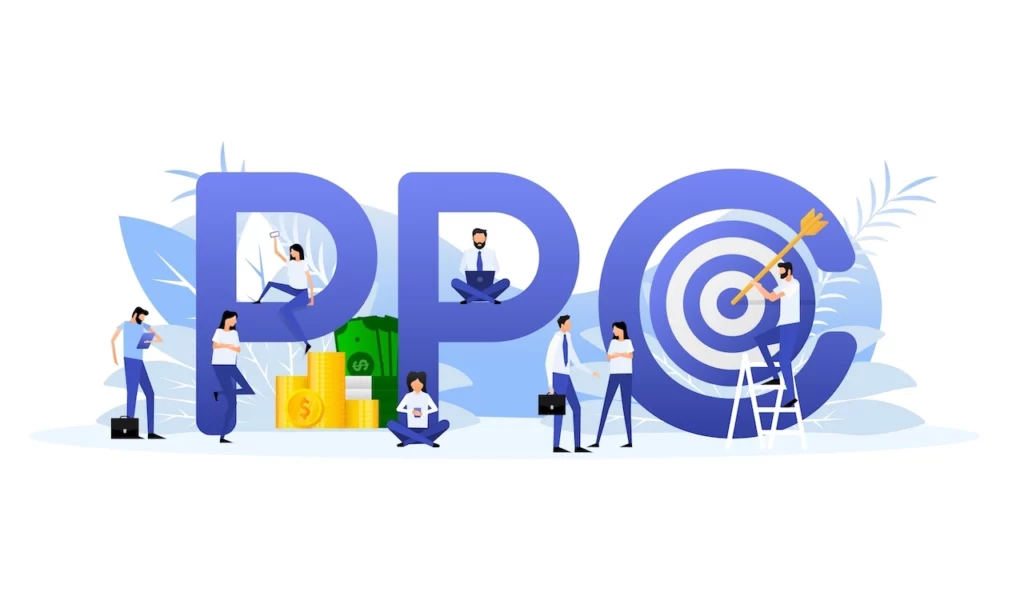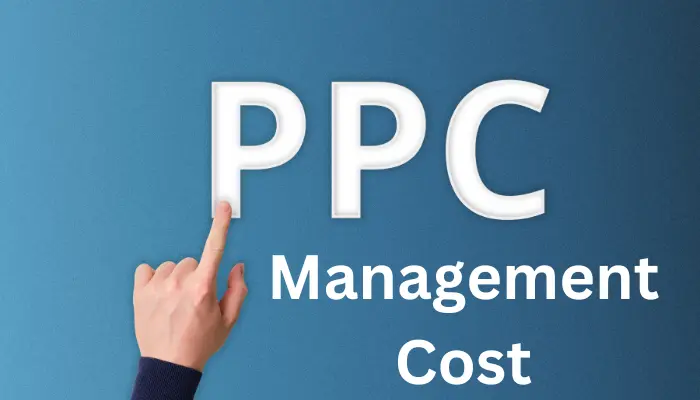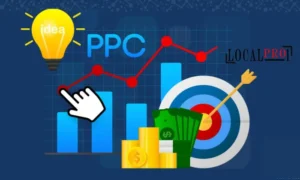Local SEO Services Near Me | Local Pro1 Welcome to...
Driving Growth: Expert PPC Management for Small Businesses
Driving Growth| Expert PPC Management for Small Businesses
Pay-Per-Click (PPC) advertising holds immense importance for small businesses in today’s digital landscape. In an era where online visibility can make or break a company, PPC offers a targeted and cost-effective solution to reach potential customers. Unlike traditional advertising methods, PPC allows small businesses to precisely target their audience based on demographics, location, and even specific keywords. This level of precision not only maximizes the efficiency of marketing budgets but also ensures that every advertising dollar is spent on reaching those most likely to convert into paying customers. LocalPro1 will provides the best PPC management for small businesses.

PPc Management For Small Business Strategies
Clear Goals and Budgeting: Define your goals clearly, whether it’s increasing sales, generating leads, or boosting brand awareness. Set a realistic budget that aligns with your business objectives.
Keyword Research: Conduct thorough keyword research to identify relevant and high-performing keywords for your business. Use tools like Google Keyword Planner or other third-party tools to discover keywords with low competition and high search volume.
Targeting the Right Audience: Refine your audience targeting based on demographics, location, interests, and online behaviour. Use negative keywords to exclude irrelevant traffic and save on ad spend.
Compelling Ad Copy: Create compelling and relevant ad copy that speaks to your target audience. Highlight unique selling points, promotions, or any special offers to encourage clicks.
Landing Page Optimization: Ensure your landing pages are aligned with your ad copy and provide a seamless user experience. Optimise landing pages for conversions, load speed, and mobile responsiveness.
Ad Extensions: Utilise ad extensions to provide additional information and encourage users to engage with your ad. Extensions such as site links, callouts, and location can enhance the visibility and appeal of your ads.
Regular Monitoring and Adjustments: Regularly monitor the performance of your PPC campaigns. Analyse key metrics such as click-through rate (CTR), conversion rate, and return on ad spend (ROAS). Make adjustments based on performance data to optimise your campaigns continuously.
A/B Testing: Conduct A/B testing for different ad copies, headlines, and images to identify what resonates best with your audience. Test various elements, such as call-to-action buttons and colours, to improve overall campaign performance.
Conversion Tracking: Implement conversion tracking to measure the success of your campaigns. Understand which keywords and ads are driving conversions and focus on optimising those.
Localised Targeting: For small businesses with a local presence, utilise geotargeting to focus on a specific geographic area. Use location-based keywords and ad copy to appeal to the local audience.
Remarketing: Implement remarketing campaigns to re-engage users who have previously visited your website. Customise ads to remind users of products or services they showed interest in.
Why is PPC Important for Small Businesses?

Cost-Effective Marketing: Small businesses often have limited budgets for marketing. PPC allows them to control their advertising spend by paying only when someone clicks on their ad. This cost-effectiveness is especially valuable for businesses with tight budgets.
Targeted Advertising: PPC platforms, such as Google Ads or Bing Ads, enable businesses to target specific demographics, locations, and even the time of day. This precision helps small businesses focus their advertising efforts on the audience most likely to convert, maximising the impact of their campaigns.
Immediate Results: Unlike some other forms of digital marketing or traditional advertising, PPC delivers quick results. Once a campaign is set up, ads can start appearing in search results almost immediately, driving traffic to a small business’s website or landing page.
Measurable ROI: PPC offers detailed analytics and tracking tools, allowing small businesses to measure the success of their campaigns accurately. This data helps in understanding what is working and what needs adjustment, providing insights for better decision-making and optimising return on investment (ROI).
Flexibility and Control: Small businesses can have a high degree of control over their PPC campaigns. They can set daily or monthly budgets, adjust bids for specific keywords, and even pause or stop campaigns if necessary. This flexibility allows for agile responses to market changes and business priorities.
Competing with Larger Businesses: PPC levels the playing field for small businesses by enabling them to appear in search results alongside larger competitors. Through effective keyword selection and targeted ad copy, small businesses can compete for visibility and attract potential customers.
Enhanced Local Presence: For small businesses operating in specific geographic areas, PPC allows for geotargeting. This means ads can be shown to users in a particular location, helping local businesses reach their target audience more effectively.
Brand Exposure and Awareness: Even if users don’t click on the ad, the visibility of the business in search results can contribute to increased brand awareness. This exposure can be particularly beneficial for small businesses looking to establish themselves in the market.
PPC Management for Small Businesses
Clear Goals and Budgeting: Define clear, measurable goals for your PPC campaigns. Whether it’s driving website traffic, generating leads, or increasing sales, having specific objectives will guide your strategy. Set a realistic budget that aligns with your business goals. Start with a manageable amount and adjust based on performance.
Keyword Research: Conduct thorough keyword research to identify relevant and cost-effective keywords for your business. Tools like Google Keyword Planner can help you discover keywords with high search volume and low competition.
Targeting and Segmentation: Clearly define your target audience. Use geographic targeting, demographics, and other factors to narrow down your audience and reach potential customers more effectively. Segment your campaigns based on products, services, or target audience to tailor your messaging and budget allocation.
Compelling Ad Copy: Craft compelling and relevant ad copy that aligns with your business offerings. Highlight unique selling propositions and include a clear call-to-action (CTA) to encourage clicks. A/B test different ad variations to identify the most effective messaging.
Landing Page Optimization: Ensure that the landing pages linked to your ads are optimized for conversions. The content should be relevant, and the page should load quickly on both desktop and mobile devices. Implement clear and persuasive calls-to-action on your landing pages.
Ad Extensions: Utilize ad extensions to provide additional information and make your ads more informative. Extensions like site links, callouts, and location extensions can improve ad visibility and performance.
Conversion Tracking: Implement conversion tracking to measure the success of your campaigns. This helps you understand which keywords and ads are driving valuable actions on your website. Regularly analyze performance data and adjust your strategy accordingly.
Monitoring and Adjusting: Regularly monitor your PPC campaigns for performance metrics such as click-through rate (CTR), conversion rate, and return on ad spend (ROAS). Make data-driven adjustments based on campaign performance, and be prepared to reallocate budget to the most successful campaigns.
Stay Informed and Adapt: Stay updated on industry trends and changes in PPC platforms. Search engines frequently update their algorithms and features, so being informed will help you adapt your strategy accordingly.
Seek Professional Assistance if Needed: If managing PPC campaigns becomes overwhelming, consider seeking the assistance of a professional or agency with expertise in PPC management. They can provide valuable insights and optimize your campaigns for better results.
PPC Management Cost

Factors Influencing Cost:
The cost of PPC management services can vary widely depending on various factors, including industry competitiveness, chosen keywords, and campaign complexity. Small businesses must carefully assess these factors when setting their PPC budgets.
Budget Allocation:
Budget allocation is a critical aspect of PPC management. It’s essential to allocate your budget strategically to get the best results. Balancing spending on keywords, ad placement, and other factors is key to maximizing ROI.
Maximizing ROI:
Ultimately, the goal of any PPC campaign is to maximize return on investment. Small businesses should focus on continuously improving their campaigns to get the most value for their marketing dollars. Regularly analyzing performance data and making data-driven adjustments is essential.
Keyword Research and Selection
Understand Your Business and Goals:
- Clearly define your business, products, or services.
- Identify your target audience and geographic location.
- Set specific goals for your online presence, such as increasing traffic, sales, or brand awareness.
Brainstorm Seed Keywords:
- Start with a list of general, relevant terms related to your business.
- Consider synonyms, variations, and terms your audience might use.
Use Keyword Research Tools:
- Utilise tools like Google Keyword Planner, SEMrush, Ahrefs, or Ubersuggest.
- Enter your seed keywords to discover related terms, search volumes, and competition levels.
Analyze Search Intent:
- Understand the intent behind the keywords – informational, navigational, transactional.
- Tailor your content to match the user’s intent.
Focus on Long-Tail Keywords:
- Long-tail keywords are more specific and can attract highly targeted traffic.
- They often have lower competition, making it easier to rank for.
Assess Competition:
- Evaluate the competition for each keyword.
- Aim for a mix of high-volume and low-competition keywords.
Consider Relevance:
- Ensure that selected keywords are directly relevant to your content.
- Avoid keyword stuffing; use keywords naturally in your content.
Monitor Trends:
- Keep an eye on industry trends and seasonality.
- Update your keyword strategy accordingly to stay relevant.
Localise if Applicable:
- If your business serves a specific location, include location-based keywords.
- Use geo-targeting options in tools to refine your search.
Regularly Review and Update:
- Search trends and algorithms change, so regularly review and update your keyword strategy.
- Adapt to shifts in user behaviour and industry changes.
User Feedback and Analytics:
- Pay attention to user feedback, comments, and questions.
- Use analytics tools to track the performance of keywords and adjust your strategy accordingly.
Test and Iterate:
- Implement a testing strategy for keywords.
- Iterate based on the performance of keywords over time.
Does PPC Work for Small Businesses?

Success Stories:
Numerous success stories highlight the effectiveness of PPC for small businesses. Companies that have effectively implemented PPC campaigns have experienced significant growth in website traffic, leads, and revenue. These success stories serve as inspiration for small businesses looking to make their mark.
Common PPC Misconceptions:
While PPC offers many advantages, there are common misconceptions that need to be addressed. Some believe that it’s too expensive or that it’s only suitable for larger companies. In reality, PPC can be tailored to fit any budget, and its effectiveness is not limited to the size of the business. It’s essential to debunk these myths to encourage small businesses to explore the potential of PPC.
Metrics for Measuring Success:
To determine the effectiveness of a PPC campaign, it’s crucial to track key metrics such as click-through rates (CTR), conversion rates, and return on investment (ROI). Small businesses can use these metrics to fine-tune their campaigns and maximize their results. Understanding the data allows for informed decisions and continual improvement.
Conclusion
Effective PPC management can be a game-changer for small businesses striving to make their mark in the digital landscape. It’s a dynamic and versatile tool that, when executed strategically, can drive targeted traffic, generate leads, and boost sales. The key lies in meticulous planning, from setting clear goals and conducting thorough keyword research to optimizing ad copy and landing pages. Feel free to contact us for any type of query or the services related to the PPC management for small businesses.
FAQs
What Is Ppc Management, And How Does It Benefit Small Businesses?
PPC (Pay-Per-Click) management involves overseeing and optimizing online advertising campaigns. For small businesses, effective PPC management ensures targeted ads, increased visibility, and a better return on investment (ROI).
Why Is Ppc Important For Small Businesses?
PPC allows small businesses to compete with larger counterparts in the online space. It provides a cost-effective way to reach a specific audience, drive traffic, and generate leads or sales.
How Does Ppc Management Help In Targeting The Right Audience For Small Businesses?
PPC management involves selecting relevant keywords, demographics, and locations to target specific audiences. This ensures that your ads are shown to potential customers who are more likely to convert.
What Platforms Are Commonly Used For Ppc Advertising For Small Businesses?
Popular PPC platforms for small businesses include Google Ads, Bing Ads, and social media platforms like Facebook and Instagram. These platforms offer various ad formats to suit different business goals.
How Does Budgeting Work In Ppc Management For Small Businesses?
Budgeting in PPC management involves setting a daily or monthly spending limit. Advertisers only pay when users click on their ads. Small businesses can control costs and allocate budgets based on performance and goals.
Our Services
Our Latest Posts
PPC White Label Services by Local Pro1 | Expert Solutions
PPC White Label Services by Local Pro1 | Expert Solutions...



